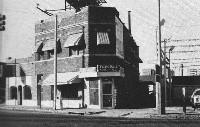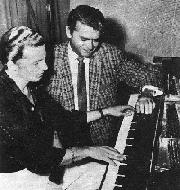

706 Union Street, Sun's original home | | |
Perhaps Sun Records is an unusual label to profile in an R&B Primer; any passing reference to Sun usually fails to get beyond the rockabilly successes, the launch of the Presley phenomenon and the careers of artists such as Johnny Cash, Jerry Lee Lewis and Roy Orbison. Even in its rockabilly heyday however, the label was fusing the best of R&B and country, black and white, sowing the seeds of rock 'n' roll. And there was more to Sun than rockabilly - its founder, Sam Phillips, was a lifelong supporter and promoter of the blues and spirituals of the American South
The story of Sun is largely the story of its founder. Phillips grew up in Florence, Alabama, listening to and absorbing the sound of the blues, along with the spirituals and hillbilly music typical of the 30s and 40s. Throughout the 40s he worked as a radio engineer and announcer, always harbouring thoughts of a studio of his own where he could create the music he wanted to hear on the radio.
The Memphis Recording Service started in 1950 and specialised in the electric blues he loved, capturing the raw Southern feel to perfection and leasing most of the finished product to independent specialists such as Chess and RPM. Five very early B.B. King sides went to RPM for example, and there were early recordings from the likes of Howlin' Wolf, Walter Horton and Rosco Gordon.

Sam with Jerry Lee Lewis | | |
After an initial stab at a label of his own (Phillips) in 1950, Sam tried again in 1952 - the start of Sun Records! As early as 1953, it secured its first national success with Rufus Thomas' 'Bear Cat' (a success tempered somewhat by litigation around royalties because of its alarming similarity to Leiber and Stoller's 'Hound Dog').
Sun continued to record a succession of excellent blues based material over the next two years, and was very much a blues oriented label. Particularly fine were releases by Junior Parker (the original 'Mystery Train'), James Cotton, Little Milton and The Prisonaires ('Just Walking In The Rain' is especially worth seeking out). Phillips own role in these recordings should not be underestimated. He recorded instrumentation at high volume, capturing the excitement of the live performance. He also experimented with sound, especially the nature of guitar recordings and in so doing he helped to create solid studio performances out of what was often an unpolished regional talent.
It was a 1954 release (Sun Records No: 209) featuring a nineteen year old white singer's version of Arthur Crudup's 'That's All Right' that turned Sun around. Elvis Presley only recorded ten sides for the label, five blues and five country, but they transformed Phillips' and Sun's fortunes. It was a synthesis of styles that would lead directly to rock'n'roll. It's a remarkable story, full of successes and accomplishments. Artists of the calibre of Johnny Cash, Carl Perkins and the great Jerry Lee Lewis achieved national prominence, whilst others, such as Sonny Burgess, Billy Riley and Warren Smith had significant regional successes. It's an incredible story, but it's Phillips' and Sun's contribution to the development of blues recording that makes the label an important addition to the Primer.
Phiilips mostly stopped recording blues as the rockabilly productions found increasingly larger commercial success, much to the chagrin of artists such as Rufus Thomas.
But Phillips himself never saw it as a betrayal, and never lost his love or passion for the music with which he grew up. He argued that when he began recording, there were very few opportunities for black blues to find its way on to record, whereas by the time he branched out there were a number of major black recording outlets, including Atlantic, Chess and Specialty. He saw the opportunity to broaden the base, to give the music more widespread exposure, and chose to do so by marrying blues, hillbilly and country and coming up with the rockabilly hybrid.
What's particularly important in the story of Sun Records in the context of an R&B Primer is its remarkable legacy of black blues and the chance the label gave to a whole range of blues performers early in their career.
You can hear the Sun Records story on the excellent 2CD collection "The Legendary Story Of Sun Records" (get it here). The blues of Howlin' Wolf, Junior Parker and Little Milton alongside the rockabilly of Billy Lee Riley and Warren Smith; the blues country hybrid of Carl Perkins' 'Matchbox' next to the classic rock'n'roll of Jerry Lee Lewis' 'Great Balls Of Fire'. It has much to recommend it to the blues and R&B fan and the choice of material is exemplary.
 |
|
|
Howlin' Wolf |
Sam described him thus....
"....the vitality of the man was something else. Just to see the man in the studio - God, what I would give to see him as he was in my studio, to see the fervour in his face, to hear the pure instinctive quality of the man's voice....."
Enough said. | 
|
Charlie Rich |
| Charlie recorded some of his earliest hits when at Sun (including 'Lonely Weekends', 'Who Will The Next Fool Be', 'Sittin' and Thinkin' ) but, even after the Billy Sherrill produced country hits of the 70s, never really established himself as the star his talent alone should have assured. Indeed, his personality and destructive behaviour pushed him increasingly away from the limelight. He did however record an album that demonstrated his true abilities in 1992, three years before his death. "Pictures and Paintings" is a wonderful testament to a great talent. His Sun recordings were very good, this album of blues, jazz R&B and country is simply an essential purchase. | 
|
Rosco Gordon |
| Gordon was originally a member of the Beale Streeters (other members included Johnny Ace. B.B. King, Bobby Bland) and found his way to Sam Phillips around 1952. Sam sold Gordon's 'Bootin' to both Chess and RPM but it still hit number one in the R&B chart. 'No More Doggin' featured what was to be Rosco's trademark, the loping piano shuffle that was christened Rosco's Rhythm. The style subsequently influenced Jamaican musicians and the development of ska and reggae. | 
|
Junior Parker |
| Born Herman Parker Jr., Junior probably first recorded for Modern around 1952. He arrived at Sun in 1953, scoring an immediate hit with 'Feelin' Good'. He followed it with 'Love My Baby' and the great 'Mystery Train' before moving on to Don Robey's Duke label. Smooth vocals, great harp solos and brass powered back up assured Parker of a number of R&B hits in the 60s, including 'Driving Wheel' and 'In The Dark'. Recorded until his death from a brain tumour in 1971, he was inducted into the Blues Hall Of Fame in 2001. | 
|
The Prisonaires |
| Five African-American male singers who were inmates of the Tennessee State Penitentiary. Sam Phillips recorded their one and only hit, the wonderful 'Just Walkin' In The Rain' in 1953. Although Phillips was not that big a fan of close harmony singing, he agreed to record them - they were transferred under guard to make the record and within weeks it had sold 50,000 copies. It subsequently sold a million when covered by Johnny Ray in 1956. |
|


Leave a comment